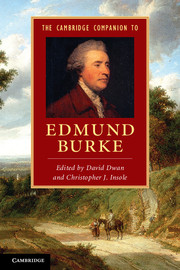Book contents
- Frontmatter
- Contents
- Contributors
- Acknowledgements
- Method of Citation
- Chronology
- Introduction Philosophy in Action
- 1 Burke’s Life
- 2 Burke, Enlightenment and Romanticism
- 3 Burke as Rhetorician and Orator
- 4 Burke’s Aesthetic Psychology
- 5 Burke on Law and Legal Theory
- 6 Burke on Political Economy
- 7 Burke and Religion
- 8 Burke and the Constitution
- 9 Burke and the Natural Law
- 10 Burke and Utility
- 11 Burke and the Ends of Empire
- 12 Burke and the American Crisis
- 13 Burke on India
- 14 Burke and Ireland
- 15 Reflections on the Revolution in France
- 16 Burke’s Counter-Revolutionary Writings
- 17 Burke in the United States
- Further Reading
- Index
- References
14 - Burke and Ireland
Published online by Cambridge University Press: 05 December 2012
- Frontmatter
- Contents
- Contributors
- Acknowledgements
- Method of Citation
- Chronology
- Introduction Philosophy in Action
- 1 Burke’s Life
- 2 Burke, Enlightenment and Romanticism
- 3 Burke as Rhetorician and Orator
- 4 Burke’s Aesthetic Psychology
- 5 Burke on Law and Legal Theory
- 6 Burke on Political Economy
- 7 Burke and Religion
- 8 Burke and the Constitution
- 9 Burke and the Natural Law
- 10 Burke and Utility
- 11 Burke and the Ends of Empire
- 12 Burke and the American Crisis
- 13 Burke on India
- 14 Burke and Ireland
- 15 Reflections on the Revolution in France
- 16 Burke’s Counter-Revolutionary Writings
- 17 Burke in the United States
- Further Reading
- Index
- References
Summary
One of the most notable developments in Burke scholarship during the last two or three decades has been the increasing attention paid to Irish experiences and contexts, and in particular to Burke’s lifelong commitment to the abolition of the penal code. In ‘Tracts on the Popery Laws’, written at the very outset of his political career, Burke anatomised the inequalities that resulted from the incomplete conquest and colonisation of Ireland. The background was the agrarian unrest raging in the southern province of Munster, where oathbound gangs of Whiteboys were resisting the enclosure of common land. The vicious reaction of the local Protestant elite crystalised Burke’s hostility to ‘the unfeeling tyranny of a mungril Irish Landlord’ (C, I: 147). Three decades later, in his Letter to Sir Hercules Langrishe (1792), Burke described the Protestant Ascendancy which ruled Ireland as a ‘plebeian oligarchy’, a monstrous contradiction in terms (WS, IX: 600). The natural relationship between property and authority, he contended, had been contorted by ethnic and religious antagonisms resulting from the Elizabethan, Jacobean and Cromwellian plantations, so that Protestant tradesmen and servants were raised above Catholic noblemen, whereas Catholic landowners, farmers, merchants and even ‘titular’ bishops were lumped together with a ‘licentious populace’ merely because of their religious beliefs (WS, IX: 602). In December 1796, shortly before the arrival of a French fleet in Bantry Bay, Burke continued to express his opposition to British policy in Ireland from his deathbed, writing sympathetically of ‘the Jacobinism which arises from Penury and irritation’ (C, IX: 162). In the periods between these well-known interventions, he frequently commented on Irish affairs, and he was an important influence on the Irish policy of Whig administrations. Moreover, this preoccupation with the social and psychological aftershocks of conquest would resonate throughout Burke’s writings on England, North America, India and France.
- Type
- Chapter
- Information
- The Cambridge Companion to Edmund Burke , pp. 181 - 194Publisher: Cambridge University PressPrint publication year: 2012
References
- 3
- Cited by

